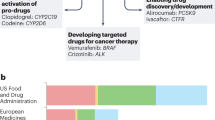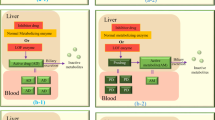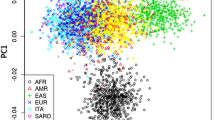Abstract
Adverse drug reaction in patients causes more than 2 million hospitalizations including 100 000 deaths per year in the United States. This adverse drug reaction could be due to multiple factors such as disease determinants, environmental and genetic factors. In order to improve the efficacy and safety and to understand the disposition and clinical consequences of drugs, two rapidly developing fields – pharmacogenetics (focus is on single genes) and pharmacogenomics (focus is on many genes) – have undertaken studies on the genetic personalization of drug response. This is because many drug responses appear to be genetically determined and the relationship between genotype and drug response may have a very valuable diagnostic value. Identification and characterization of a large number of genetic polymorphisms (biomarkers) in drug metabolizing enzymes and drug transporters in an ethnically diverse group of individuals may provide substantial knowledge about the mechanisms of inter-individual differences in drug response. However, progress in understanding complex diseases, its negative psychosocial consequences, violation of privacy or discrimination, associated cost and availability and its complexity (extensive geographic variations in genes) may become potential barriers in incorporating this pharmacogenetic data in risk assessment and treatment decisions. In addition, it requires increased enthusiasm and education in the clinical community and an understanding of pharmacogenetics itself by the lay public. Although individualized medications remain as a challenge for the future, the pharmacogenetic approach in drug development should be still continued. If it becomes a reality, it delivers benefits to improve public health and allow genetically subgroup diseases thereby avoiding adverse drug reactions (by knowing in advance who should be treated with what drug and how).
This is a preview of subscription content, access via your institution
Access options
Subscribe to this journal
Receive 6 print issues and online access
$259.00 per year
only $43.17 per issue
Buy this article
- Purchase on Springer Link
- Instant access to full article PDF
Prices may be subject to local taxes which are calculated during checkout
Similar content being viewed by others
References
Lazarou J, Pomeranz BH, Corey PN . Incidence of adverse drug reactions in hospitalized patients: a meta-analysis of prospective studies. JAMA 1998; 279: 1200–1205.
Dormann H, Neubert A, Criegee-Rieck M, Egger T, Radespiel-Troger M, Azaz-Livshits T et al. Readmissions and adverse drug reactions in internal medicine: the economic impact. J Int Med 2004; 255: 653–663.
Zheng CJ, Sun LZ, Han LY, Ji ZL, Chen X, Chen YZ . Drug ADME associated protein data base as a resource for facilitating pharmacogenomics research. Drug Dev Res 2004; 62: 134–142.
Lin M, Aquilante C, Johnson JA, Wu R . Sequencing drug response with HapMap. Pharmacogenomics J 2005; 5: 149–156.
Stoughton RB, Friend SH . How molecular profiling could revolutionize drug discovery. Nat Rev Drug Discov 2005; 4: 345–350.
Phillips KA, Van Bebber SL . Measuring the value of pharmacogenomics. Nat Rev Drug Discov 2005; 4: 500–509.
Wilkinson GR . Drug metabolism and variability among patients in drug response. N Engl J Med 2005; 352: 2211–2221.
Shastry BS . Genetic diversity and new therapeutic concepts. J Hum Genet 2005; 50: 321–328.
Shastry BS . Role of SNP/haplotype in gene discovery and drug development: an overview. Drug Dev Res 2004; 62: 143–150.
Glodstein DB, Tate SK, Sisodiya SM . Pharmacogenetics goes genomic. Nat Rev Genet 2003; 4: 937–947.
Szekeres T, Haushofer A . Clinical pharmacogenetics of immunosuppressive drugs in organ transplantation. Pharmacogenomics 2005; 6: 163–168.
Hesselink DA, van Gelder T, van Schaik RH . The pharmacogenetics of calcineurin inhibitors: one step closer toward individualized immunosuppression? Pharmacogenomics 2005; 6: 323–337.
Xie H-G, Kim RB, Wood AJJ, Stein CM . Molecular basis of ethnic differences in drug disposition and response. Ann Rev Pharmacol Toxicol 2001; 41: 815–850.
de Leon J, Susce MT, Pan RM, Fairchild M, Koch WH, Wedlund PJ . The CYP2D6 poor metabolizer phenotype may be associated with risperidone adverse drug reactions and discontinuation. J Clin Psychiatry 205; 66: 15–27.
Voora D, Eby C, Linder MW, Milligan PE, Bukaveckas BL, McLeod HL et al. Prospective dosing of warfarin based on cytochrome P450 2C9 genotype. Thromb Haemost 2005; 93: 700–705.
Guo Y, Zhang Y, Wang Y, Chen X, Si D, Zhong D et al. Role of CYP2C9 and its variants (CYP2C9*3 and CYP2C9*13) in the metabolism of lornoxicam in humans. Drug Metab Dispos 2005; 33: 749–753.
Totah RA, Rettie AE . Cytochrome P450 2C8: substrates, inhibitors, pharmacogenetics and clinical relevance. Clin Pharmacol Ther 2005; 77: 341–352.
He P, Court MH, Greenblatt DJ, Von Moltke LL . Genotype-phenotype associations of cytochrome P450 3A4 and 3A5 polymorphism with midazolam clearance in vivo. Clin Pharmacol Ther 2005; 77: 373–387.
Lepper ER, Nooter K, Verweij J, Acharya MR, Figg WD, Sparreboom A . Mechanism of resistance to anticancer drugs: the role of the polymorphic ABC transporters ABCB1 and ABCG2. Pharmacogenomics 2005; 6: 115–138.
Hulot JS, Villard E, Maguy A, Morel V, Mir L, Tostivint I et al. A mutation in the drug transporter gene ABCC2 associated with impaired methotrexate elimination. Pharmacogenet Genomics 2005; 15: 277–285.
Lim AY, Gaffney K, Scott DG . Methotrexate-induced pancytopenia: serious and under reported? Our experience of 25 cases in 5 years. Rheumatology 2005; 44: 1051–1055.
Sills GJ, Mohanraj R, Butler E, McCrindle S, Collier L, Wilson EA et al. Lack of association between the C3435T polymorphism in the human multidrug resistance (MDR1) gene and response to antiepileptic drug treatment. Epilepsia 2005; 46: 643–647.
Wang L, Nguyen TV, McLaughlin RW, Sikkink LA, Ramirez-Alvarado M, Weinshilboum RM . Human thiopurine S-methyltransferase pharmacogenetics: variant allozyme misfolding and aggresome formation. Proc Natl Acad Sci USA 2005; 102: 9394–9399.
Stanulla M, Schaeffeler E, Flohr T, Cario C, Schrauder A, Zimmermann M et al. Thiopurine methyltransferase (TPMT) genotype and early treatment response to mercaptopurine in childhood acute lymphoblastic leukemia. JAMA 2005; 293: 1485–1489.
McLeod HL, Krynetski EY, Relling MV, Evans WE . Genetic polymorphism of thiopurine methyltransferase and its clinical relevance for childhood acute lymphoblastic leukemia. Leukemia 2000; 14: 567–572.
Schaeffeler E, Fischer C, Brockmeier D, Wernet D, Moerike K, Eichelbaum M et al. Comprehensive analysis of thiopurine S-methyltrasnsferase (TPMT) phenotype–genotype correlation in a large population of German–Caucasians and identification of novel TPMT variants. Pharmacogenetics 2004; 14: 407–417.
Gearry RB, Barclay ML . Azathioprine and 6-mercaptopurine pharmacogenetics and metabolite monitoring in inflammatory bowel disease. Gastroenterol Hepatol 2005; 20: 1149–1157.
Etienne MC, Formento JL, Chazal M, Francoual M, Magne N, Formento P et al. Methylenetetrahydrofolate reductase gene polymorphisms and response to fluorouracil-based treatment in advanced colorectal cancer patients. Pharmacogenetics 2004; 14: 785–792.
Gomes ER, Demoly P . Epidemiology of hypersensitivity drug reactions. Curr Opin Allergy Clin Immunol 2005; 5: 309–316.
Vadlamani L, Iyenger S . Tumor necrosis factor alpha polymorphism in heart failure/cardiomyopathy. Congest Heart Fail 2004; 10: 289–292.
McNamara DM . Pharmacogenetics in heart failure: genomic markers of endothelial and neurohumoral function. Congest Heart Fail 2004; 10: 302–308.
Maitland-van der zee AH, Turner ST, Schwartz GL, Chapman AB, Klungel OH, Boerwinkle E . A multilocus approach to the antihypertensive pharmacogenetics of hydrochlorothiazide. Pharmacogenet Genomics 2005; 15: 287–293.
Liljedahl U, Kahan T, Malmqvist K, Melhus H, Syvanen AC, Lind L, Kurland L . Single nucleotide polymorphisms predict the change in left ventricular mass in response to antihypertensive treatment. J Hypertens 2005; 22: 2273–2275.
Mellen PB, Herrington DM . Pharmacogenomics of blood pressure response to antihypertensive treatment. J Hypertens 2005; 23: 1311–1325.
King D, Etzel JP, Chopra S, Smith J, Cadman PE, Rao F et al. Human response to alpha 2-adrenergic agonist stimulation studied in an isolated vascular bed in vivo: biphasic influence of dose, age, gender and receptor genotype. Clin Pharmacol Ther 2005; 77: 388–403.
Terra SG, Pauly DF, Lee CR, Patterson JH, Adams KF, Schofield RS et al. beta-adrenergic receptor polymorphisms and responses during titration of metoprolol controlled release/extended release in heart failure. Clin Pharmacol Ther 2005; 77: 127–137.
Taylor MR, Bristow MR . The emerging pharmacogenomics of the beta-adrenergic receptors. Congest Heart Fail 2004; 10: 281–288.
Tantisira KG, Small Km, Litonjua AA, Weiss ST, Liggett SB . Molecular properties and pharmacogenetics of a polymorphism of adenylyl cyclase type 9 in asthma: interaction between beta-agonist and corticosteroid pathways. Hum Mol Genet 2005; 14: 1671–1677.
Kukreti R, Bhatnagar P, B-Rao C, Gupta S, Madan B, Das C et al. Beta (2)-adrenergic receptor polymorphisms and response to salbutamol among Indian asthmatics. Pharmacogenomics 2005; 6: 399–410.
Serrette A, Artioli P, Quartesan R . Pharmacogenetics in the treatment of depression: pharmacodynamic studies. Pharmacogenet Genomics 2005; 15: 61–67.
Sink KM, Holden KF, Yaffe K . Pharmacological treatment of neuropsychiatric symptoms of dementia. JAMA 2005; 293: 596–608.
Rybakowsky JK, Suwalska A, Czerski PM, Dmitrzak-Weglarz M, Leszczynska-Rodziewicz A, Hauser J . Prophylactic effect of lithium in bipolar affective illness may be related to serotonin transporter genotype. Pharmacol Rep 2005; 57: 124–127.
Reynolds GP, Yao Z, Zhang X, Sun J, Zhang Z . Pharmacogenetics of treatment in first-episode schizophrenia: D3 and 5-HT2C receptor polymorphisms separately associate with positive and negative symptom response. Eur Neuropsychopharmacol 2005; 15: 143–151.
Wilffert B, Zaal R, Brouwers JR . Pharmacogenetics as a tool in the therapy of schizophrenia. Pharm World Sci 2005; 27: 20–30.
Ferraro TN, Buono RJ . The relationship between pharmacology of antiepileptic drugs and human gene variation: an overview. Epilepsy Behav 2005; 7: 18–36.
Tate SK, Depondt C, Sisodiya SM, Cavalleri GL, Schorge S, Soranzo N et al. Genetic predictors of the maximum doses patients receive during clinical use of the anti-epileptic drugs carbamazepine and phenytoin. Proc Natl Acad Sci USA 2005; 102: 5507–5512.
Soranzo N, Goldstein DB, Sisodiya SM . The role of common variation in drug transporter genes in refractory epilepsy. Expert Opin Pharmacother 2005; 6: 1305–1312.
Linazasoro G . New ideas on the origin of l-Dopa-induced dyskinesias: age, genes and neural plasticity. Trends Pharmacol Sci 2005; 26: 391–397.
Stamer UM, Bayerer B, Stuber F . Genetics and variability in opioid response. Eur J Pain 2005; 9: 101–104.
Kreek MJ, Bart G, Lilly C, LaForge KS, Nielsen DA . Pharmacogenetics and human molecular genetics of opiate and cocaine addictions and their treatments. Pharmacol Rev 2005; 57: 1–26.
Gourlay GK . Advances in opioid pharmacology. Support Care Cancer 2005; 13: 153–159.
Mogil JS, Ritchie J, Smith SB, Strasburg K, Kaplan L, Wallace MR et al. Melanocortin-1 receptor gene variants affect pain and (micro)-opioid analgesin in mice and humans. J Med Genet 2005; 42: 583–587.
Krishnaswamy S, Hao Q, Al-Rohaimi A, Hesse LM, von Moltke LL, Greenblatt DJ et al. UDP Glucuronosyltransferase (UGT) 1A6 pharmacogenetics: identification of polymorphisms in the 5′-regulatory and exon 1 regions, and association with human liver UGT1A6 gene expression and glucuronidation. Pharmacol Exp Ther 2005; 313: 1331–1339.
Krishnaswamy S, Hao Q, Al-Rohaimi A, Hesse LM, von Moltke LL, Greenblatt DJ et al. UDP glucuronosyltransferase (UGT) 1A6 pharmacogenetics: functional impact of the three most common non-synonymous UGT1A6 polymorphisms (S7A, T181A, and R184S). Pharmacol Exp Ther 2005; 313: 1340–1346.
Dahl JP, Doyle GA, Oslin DW, Buono RJ, Ferraro TN, Lohoff FW et al. Lack of association between single nucleotide polymorphisms in the corticotrophin releasing hormone receptor 1 (CRHR 1) gene and alcohol dependence. J Psychiatr Res 2005; 39: 475–479.
Daar AS, Singer PA . Pharmacogenetics and geographical ancestry: implications for drug development and global health. Nat Rev Genet 2005; 6: 241–246.
Rahemtulla T, Bhopal R . Pharmacogenetics and ethnically targeted therapies. BMJ 2005; 330: 1036–1037.
Chowbay B, Zhou S, Lee EJ . An interethnic comparison of polymorphisms of the genes encoding drug-metabolizing enzymes and drug transporters: experience in Singapore. Drug Metab Rev 2005; 37: 327–378.
Mori M, Yamada R, Kobayashi K, Kawaida R, Yamamoto K . Ethnic differences in allele frequency of autoimmune disease-associated SNPs. J Hum Genet 2005; 50: 264–266.
Mitchell AA, Chakravarti A, Cutler DJ . On the probability that a novel variant is a disease-causing mutation. Genome Res 2005; 15: 960–966.
Kaplan JB, Bennett T . Use of race and ethnicity in biomedical publication. JAMA 2003; 289: 2709–2716.
Freudenberg-Hua Y, Freudenberg J, Winantea J, Kluck N, Cichon S, Bruss M et al. Systematic investigation of genetic variability in 111 human genes – implication for studying variable drug response. Pharmacogenomics J 2005; 5: 183–192.
Rieder MJ, Reiner AP, Gage BF, Nickerson DA, Eby CS, McLeod HL et al. Effect of VKORC1 haplotypes on transcriptional regulation and warfarin dose. N Engl J Med 2005; 352: 2285–2293.
Hall AM, Wilkins MR . Warfarin: a case history in pharmacogenetics. Heart 2005; 9: 563–564.
Yu CM, Chan TYK, Critchley JAJH, Woo KS . Factors determining the maintenance dose of warfarin in Chinese patients. Q J Med 1996; 89: 127–135.
Yu CM, Chan TY, Tsoi WC, Sanderson JE . Heparin therapy in the Chinese – lower doses are required. Q J Med 1997; 90: 535–543.
Taylor AL, Zieshe S, Yancy C, Carson P, D’Agostino R, Ferdinand K et al. Combination of isosorbide dinitrate and hydralazine in blacks with heart failure. N Engl J Med 2004; 351: 2049–2057.
Lindpaintner K . Pharmacogenetics and pharmacogenomics. Methods Mol Med 2005; 108: 235–260.
Need AC, Motulsky AG, Goldstein GB . Priorities and standards in pharamacogenetic research. Nat Genet 2005; 37: 671–681.
Rogausch A, Brockmoller J, Himmel W . Pharmacogenetics in future medical care – implications for patients and physicians. Gresundheitswesen 2005; 67: 257–263.
Efferth T, Volm N . Pharmacogenetics for individualized cancer chemotherapy. Pharmacol Ther 2005; 107: 155–176.
Smits KM, Schouten JS, Smits LJ, Stelma FF, Nelemans P, Prins MH . A review on the design and reporting of studies on drug–gene interaction. J Clin Epidemiol 2005; 58: 651–654.
Author information
Authors and Affiliations
Corresponding author
Rights and permissions
About this article
Cite this article
Shastry, B. Pharmacogenetics and the concept of individualized medicine. Pharmacogenomics J 6, 16–21 (2006). https://doi.org/10.1038/sj.tpj.6500338
Received:
Revised:
Accepted:
Published:
Issue Date:
DOI: https://doi.org/10.1038/sj.tpj.6500338
Keywords
This article is cited by
-
Considerations for Embedding Inclusive Research Principles in the Design and Execution of Clinical Trials
Therapeutic Innovation & Regulatory Science (2023)
-
Einfluss von Kultur und Religion auf die Therapie von Krebspatienten
Der Urologe (2019)
-
Glutathione S-transferases deletions may act as prognosis and therapeutic markers in breast cancer
Clinical and Experimental Medicine (2018)
-
Time-resolved metabolomics analysis of individual differences during the early stage of lipopolysaccharide-treated rats
Scientific Reports (2016)
-
Development of a Physiologically Based Pharmacokinetic/Pharmacodynamic Model to Predict the Impact of Genetic Polymorphisms on the Pharmacokinetics and Pharmacodynamics Represented by Receptor/Transporter Occupancy of Central Nervous System Drugs
Clinical Pharmacokinetics (2016)



